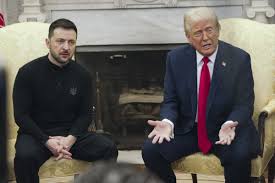
Breaking News
 Violent tornado causes catastrophic damage near Lake City, Arkansas, leaving 40K w/out power
Violent tornado causes catastrophic damage near Lake City, Arkansas, leaving 40K w/out power
 The Senate Just Passed Rand Paul's Bill To Block Trump's Tariffs on Canada
The Senate Just Passed Rand Paul's Bill To Block Trump's Tariffs on Canada
 Can Trump Broker a TikTok Sale Before the April 5 Deadline?
Can Trump Broker a TikTok Sale Before the April 5 Deadline?
 A Powerful Government and a Weak Nation
A Powerful Government and a Weak Nation
Top Tech News
 Watch the Jetson Personal Air Vehicle take flight, then order your own
Watch the Jetson Personal Air Vehicle take flight, then order your own
 Microneedles extract harmful cells, deliver drugs into chronic wounds
Microneedles extract harmful cells, deliver drugs into chronic wounds
 SpaceX Gigabay Will Help Increase Starship Production to Goal of 365 Ships Per Year
SpaceX Gigabay Will Help Increase Starship Production to Goal of 365 Ships Per Year
 Nearly 100% of bacterial infections can now be identified in under 3 hours
Nearly 100% of bacterial infections can now be identified in under 3 hours
 World's first long-life sodium-ion power bank launched
World's first long-life sodium-ion power bank launched
 3D-Printed Gun Components - Part 1, by M.B.
3D-Printed Gun Components - Part 1, by M.B.
 2 MW Nuclear Fusion Propulsion in Orbit Demo of Components in 2027
2 MW Nuclear Fusion Propulsion in Orbit Demo of Components in 2027
 FCC Allows SpaceX Starlink Direct to Cellphone Power for 4G/5G Speeds
FCC Allows SpaceX Starlink Direct to Cellphone Power for 4G/5G Speeds
Zelensky lacks feasible alternative to taking Trump resource deal

Trump warned last weekend that Zelensky will have "some problems – big, big problems" if he "tries to back out of the rare earth deal" amidst reports that the latest version of this agreement is very lopsided.
It allegedly compels Ukraine to contribute half of its revenue from all resource projects and related infrastructure into a US-controlled investment fund, pay off all US aid from 2022 onward through these means, and give the US the right of first offer on new projects and a veto over resource sales to others.
These tougher terms can be considered punishment for Zelensky's picking his infamous fight with Trump and Vance at the White House in late February, but the whole package is being sold to Ukraine as a "security guarantee" from the US.
The argument goes that America won't let Russia threaten these projects, which also include pipelines and ports – thus leading the US to, at the very least, resume 2023 levels of military-intelligence aid and maybe even directly escalate to get Russia to back down.
Ukraine kinda already has such Article 5-like guarantees from the US and other major NATO countries per the bilateral pacts that it clinched with them all throughout last year as explained here, but this proposed arrangement gives the US tangible stakes in deterring or immediately stopping hostilities.
The trade-off, though, is that Ukraine must sacrifice part of its economic sovereignty, which is politically uncomfortable since Zelensky told his compatriots that they're fighting to preserve its full sovereignty.
If Zelensky were to agree to Trump's lopsided resource deal, then the optics of any ceasefire, armistice, or peace treaty would pair with de facto global recognition of Russian control over the fifth of Ukraine's pre-2014 territory that Kiev still claims as its own to craft the perception of a joint asymmetrical partition.
Not only might Zelensky's political career end if Ukraine were then forced to hold truly free and fair elections, but his envisaged legacy in Ukrainians' eyes as this century's top "freedom fighter" would also be shattered.
He doesn't have any feasible alternative, though, since going behind Trump's back to reach a comparatively better deal with the Brits and/or Europeans wouldn't result in the "security guarantees" that he's convinced himself that Ukraine needs in order to compromise with Russia.

 How Big Tech Plans To Read Your Mind
How Big Tech Plans To Read Your Mind AI, Nature & Legal Personhood
AI, Nature & Legal Personhood


